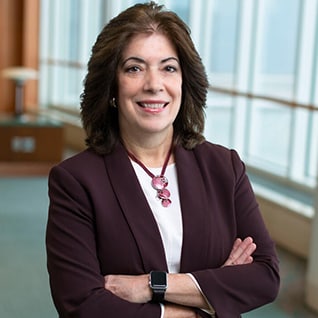Meet The Faculty
The Division of Endocrinology, Diabetes, Metabolism and Nutrition at Mayo Clinic is the largest unified practice of its kind in the United States. Members of the division complete more than 14,000 patient visits in a given year.
The division is organized around interest groups oriented toward disease processes, specific glands, or patient groups. Clinical expertise is integrated with the newest forms of established and experimental diagnostic and therapeutic methods. Patient care is provided by teams of physicians and other health care staff with broad expertise in all forms of endocrine and metabolic disorders.
From the program director
Thank you for your interest in the Endocrinology Diabetes and Metabolism Fellowship at Mayo Clinic's campus in Rochester, Minnesota. We invite you to consider an educational experience designed to provide the best training available in developing clinical expertise and academic ability.
Our program offers a two-year Clinical Scholar Track and a three-year NIH-Sponsored Track. Through mentoring, exposure to the entire spectrum of clinical endocrinology, and stimulating research experiences, you explore your interests and refine your career goals.
Our size, infrastructure, and unique program-funding mechanisms allow the Clinical Scholar Track to be tailored to meet your evolving interests and career development needs. In this track, you will be able to take advantage of dedicated career development time to individualize your training experience and pursue your unique interests. We have a dedicated and very committed group of faculty members who are passionate about teaching and mentoring. The NIH track is selective and designed for those committed to pursuing a laboratory-based research career.
As a fellow, you have access to professional resources that will help guide your career development. The Division of Endocrinology, Diabetes, Metabolism and Nutrition has physicians, clinician-investigators, physician-scientists, and basic scientists with expertise in all major areas of endocrine and metabolic disease.
At Mayo Clinic, we are at the forefront of providing innovative treatments to our patients by translating our research discoveries to improve patient care. You will have access to some of the most advanced diagnostic and therapeutic tools available anywhere in the world, including state-of-the-art thyroid ultrasound and fine-needle aspiration procedure rooms with same-day cytology, an endocrine testing center integrated within the clinic, in-house same-day endocrine laboratory test results, selective venous sampling and selective arterial stimulation testing, endocrine surgery subspecialists, and more.
Together, we will care for patients and learn in Mayo Clinic's system of health care that is unsurpassed anywhere in terms of quality, efficiency, technology, safety, and compassion.
We encourage you to explore our website and contact us with any questions about our program.
M. Regina Castro, M.D.
Endocrinology Diabetes and Metabolism Fellowship Director
Faculty
In addition to caring for patients in clinical practice, Mayo Clinic's 36 staff endocrinologists serve as both teachers and mentors. Their various backgrounds result in an exceptional depth and breadth of clinical expertise and for fellows who are fully integrated into all aspects of our academically diverse Division of Endocrinology, Diabetes, Metabolism and Nutrition. Most of our faculty members have published and lectured extensively and are highly regarded in their fields. Many of them sit on Guidelines Committees and are national leaders in their fields of expertise. You work closely with these individuals throughout your training in the Endocrinology Fellowship.
Advisers and mentors
Faculty advisers are available to provide comprehensive educational advice and personal support. You meet with your adviser periodically throughout the program to review your progress and career goals, and ensure that your educational needs are being met. Also, your adviser may serve as a contact point for introducing you and your family to Rochester, Minnesota, and the Mayo Clinic system.
Visiting professors
Many prominent professors visit Mayo Clinic each year. They present their work during lectures, participate in hospital rounds and have informal discussions with trainees. You are encouraged to take full advantage of these educational opportunities.